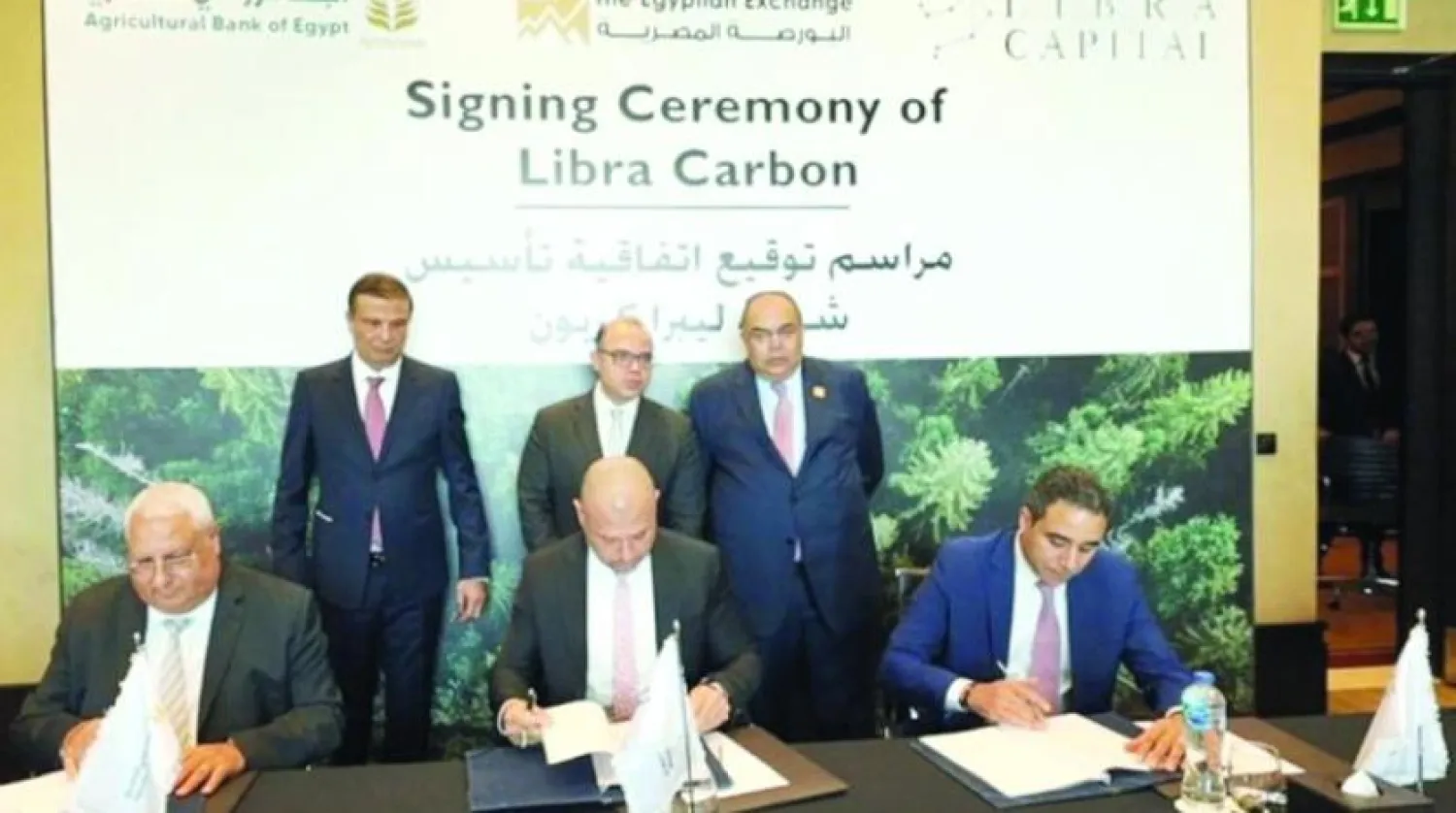The Egyptian Exchange (EGX) Holding Company for Capital Markets Development, the Agricultural Bank of Egypt, and Libra Capital Group signed a framework to establish a Carbon Certificates Trading Company.
The company will develop, manage, and issue carbon certificates and environmental products.
The platform is scheduled to determine the number of carbon emissions targeted to be reduced for each company or sector separately and the target price per ton during the coming period.
The signing ceremony was attended by the climate leader for the Egyptian presidency of the COP27 summit Mahmoud Mohieldin, chairperson of the Financial Regulatory Authority (FRA) Mohamed Farid, and a group of representatives of major international renewable energy companies.
The agreement was signed by EGX Chairman Ramy el-Dakany, Deputy Chairman of the Agricultural Bank of Egypt Sami Abdel-Sadek, and director of Libra Capital Sherif Magdy el-Gabaly.
The cooperation was announced on the sidelines of the Dii Desert Energy conference and comes within the framework of the Egyptian Stock Exchange's efforts to diversify investment options for investors, especially financial products that positively impact climate change.
Mohieldin announced an African Carbon Market Initiative with the support of several institutions to set standards and regulatory systems and adapt international rules in carbon markets to African needs, noting that it is possible to acquire added value within African countries.
He explained that Europe is the best in terms of standards and activity in carbon markets, and China has benefited from it and adapted it to its needs, hoping the market will be active in Africa and Egypt.
The official indicated that several European, Asian, and Gulf companies are trying to cooperate in setting standards and rules for transparency.
In turn, Farid expressed his happiness at the progress being made by all actors and players that play an essential role in developing a clear framework to be the primary nucleus for announcing the birth of an organized market for the trading of carbon certificates, which includes all the necessary and sufficient components, not only For trading and even issuance.
He stressed that the countries' response to climate change is a necessity to protect the world from the devastating effects due to the impact of global warming levels on human life.
Farid asserted the need to increase awareness levels by spreading the principle of carbon neutrality among various economic entities, focusing on introducing them to the advantages of commercial reductions.
Carbon reduction will enable the issuance of certificates that can be sold or traded, leading to a decrease in its price, which is consistent with the objectives of the UN Climate Summit, namely mitigation and adaptation, and providing the necessary funds, said Farid.
EGX Chairman explained that the framework agreement aims to establish a leading regional company to create new horizons for cooperation at the continental and regional levels to encourage green investment and diversify investment options.
Dakany explained that enhancing Egypt's competitiveness as a major financial center for African markets comes within EGX's efforts to develop and establish an African voluntary platform for trading carbon certificates.
The Chairman of the Agricultural Bank of Egypt, Alaa Farouk, which deals with 3.5 million customers nationwide, said that trading carbon credits is essential to help agricultural land owners.
The alliance seeks to achieve agricultural sustainability, reduce carbon emissions, and sustainability, said Farouk, adding that Libra Carbon will have a practical impact on Egypt in executing the plan to reduce carbon emissions.
For his part, Gabaly explained that the agreement enhances the company's efforts in green energy, reducing emissions, and preserving the environment, primarily that the Enara group has implemented several solar power plants inside Egypt.
He stated that establishing the first entity to manage and develop the environmental products and carbon market in Egypt enhances the company's efforts in green energy, reducing emissions, and preserving the environment.
CEO of Dii Desert Energy, Cornelius Matthes, said there is significant global interest in the carbon certificates trading market.
According to Matthes, Egypt can lead this field given its many renewable energy projects and the trend towards implementing more green hydrogen production projects.









